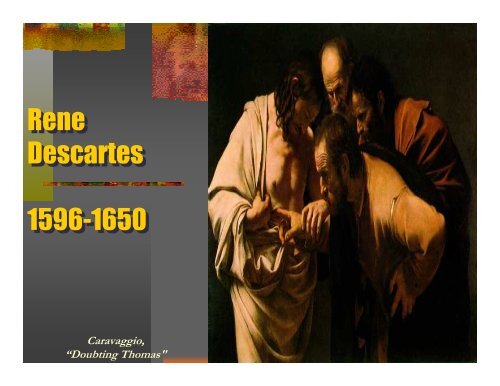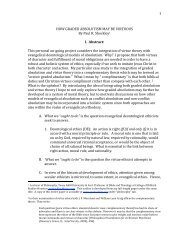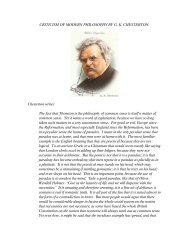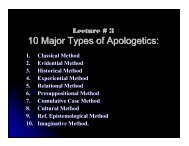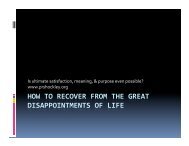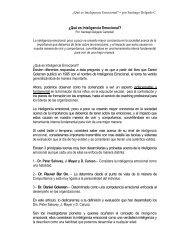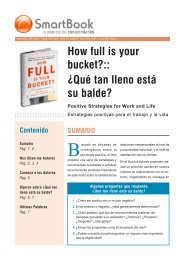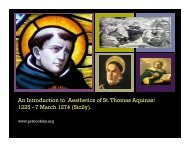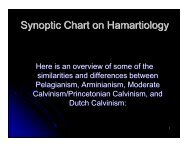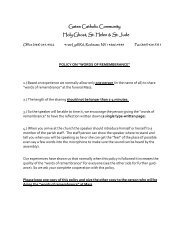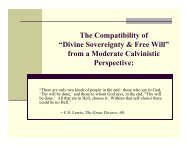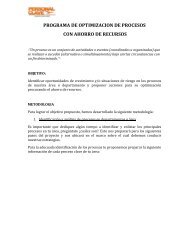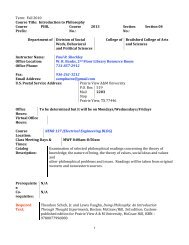Rene Descartes 1596-1650 Rene Descartes 1596-1650
Rene Descartes 1596-1650 Rene Descartes 1596-1650
Rene Descartes 1596-1650 Rene Descartes 1596-1650
- No tags were found...
You also want an ePaper? Increase the reach of your titles
YUMPU automatically turns print PDFs into web optimized ePapers that Google loves.
<strong>Rene</strong><strong>Descartes</strong><strong>1596</strong>-<strong>1650</strong>Caravaggio,“Doubting Thomas"1
Overview of <strong>Rene</strong> <strong>Descartes</strong>’ MeditationsI. Background.II. Summary.III. Meditation I.IV. Meditation II.V. Meditation III.VI. Meditation IV.VII. Meditation V.VIII. Meditation VI2
<strong>Rene</strong> <strong>Descartes</strong>(<strong>1596</strong>-<strong>1650</strong>):When our own ideas are absolutelyclear & distinct, free from allcontradiction, then we are certainwe possess the truth.3
I. Background:<strong>1596</strong>-<strong>1650</strong>, born at La Haye, a smalltown in Touraine, France.Educated at a Jesuit college of LaFleche. He was dissatisfied with thecourse of instruction because itchiefly consisted of the transmissionof the received opinions.1637 he published Discourse onMethod.1640 he grievously experienced thedeath of his 5 yr. old illegitimatedaughter Francine.4
I. Background:Educated at a Jesuit college of LaFleche. He was dissatisfied with thecourse of instruction because it chieflyconsisted of the transmission ofreceived opinions.1619 in a series of dreams <strong>Descartes</strong>was convinced that he was favored byGod, destined to be a philosopher.These dreams motivated him to inventa method of formal reasoning thatwould unite both mathematics and thephysical sciences.5
I. Background:1641 he publishedMeditations on TheFirst Philosophy withsix sets of objectionsfrom variousdistinguished persons(including Hobbesand Gassendi),&<strong>Descartes</strong>’ Repliesto the Objections.6
I. Background:1644 <strong>Descartes</strong> publishedPrinciples of Philosophy.1649 he became (with muchhesitation) an instructor to Queen“King” Christina of Sweden.1649 He published The Passionsof the Soul.Feb. 11 th , <strong>1650</strong> he died ofpneumonia as a result of theSwedish climate and demandsmade upon him by the Queen.7
Outline:I. Search for Intellectual CertaintyII. <strong>Descartes</strong>’ Goal, Method, & PlanIII.Method:Example from mathematicsIntuition and DeductionRules of MethodIII. Methodic DoubtReversal doubtCogito and the selfV. The Existence of GodVI.VII.VIII.The Existence of ThingsMind and BodyOther Models8
I. I. The Search for Intellectual Certainty:1. Jesuit college of La Fleche. <strong>Descartes</strong> with problem of intellectual certainty.Attending one of the most celebrates school in Europe, yet he “found myselfembarrassed with … many doubts and errors.”2. Ancient literature stimulated the mind but could not guide behavior.3. Though he honored theology and seemed to remain a pious Catholic to theend, he did not find in theology a method by which these truths could bearrived at solely through the power of reason.4. In philosophy, “no single things is to be found in it which is not subject ofdispute, and in consequence which is not dubious.”5. In practical life by means of traveling, “the great book of the world,” he metmen of diverse temperaments and conditions” and collected variousexperiences.” Among men of the world, he hoped to discover more exactmeaning in practical life. But, he found as much difference of opinion amongpractical people as among philosophers.9
I. I. The Search for Intellectual Certainty:6. From his experience with the book of the world, <strong>Descartes</strong> decided “to believenothing too certainly of which I had only been convinced by example andcustom.”7. He resolved to continue his search for certainty and on 10 November 1619,had three dreams, which unmistakably convinced him that he must constructthe system of true knowledge upon the powers of human reason alone.8. <strong>Descartes</strong> broke with the past to give philosophy a fresh start. His system oftruth will be derived from his own rational powers; he will no longer rely onprevious philosophers for his ideas, nor accept any idea as truly only because itwas expressed by someone with authority. Aristotle’s reputation nor theauthority of the church could suffice to produce the kind of certainty hesought.10
II. <strong>Descartes</strong>’ Goal:Lay the foundations for acquiring certain knowledge of theworld and to proceed to acquire that knowledge through acareful use of the method he prescribed.If we use reason carefully, following his method, then we willbe able to attain certain knowledge of the truth.All aspects of nature may be investigated the same way, andthat, ultimately, we may hope to achieve a unified11understanding of the world.
II. <strong>Descartes</strong>’ Method:<strong>Descartes</strong> placed a priority on epistemology and findinga method of acquiring knowledge.Skeptical of knowledge he had learned in his schooling.How can one distinguish true beliefs from false beliefs?How could the false beliefs <strong>Descartes</strong> acquired be discounted,and only true beliefs be accepted?Since <strong>Descartes</strong> was “especially pleased with mathematics,because of the certainty and self-evidence of its proofs,” andalso that he “… was astonished that nothing more noble hadbeen built on so firm and solid a foundation.”12
Method: The Need for the Meditations:“Some years ago I was struck by the largenumber of falsehoods that I had accepted astrue in my childhood, and by the highlydoubtful nature of the whole edifice that I hadsubsequently based on them. I realized that itwas necessary, once in the course of my life, todemolish everything completely and start againright from the foundations if I wanted toestablish anything at all in the sciences thatwas stable and likely to last” (m. 18).13
The Method:<strong>Descartes</strong> continues,“Once the foundationsof a building areundermined, anythingbuilt on them collapsesof its own accord; so Iwill go straight for thebasic principles onwhich all my formerbeliefs rested” (m. 18).14
<strong>Descartes</strong>’ Method:Knowledge Requires Certainty:Since <strong>Descartes</strong> believed that real knowledge requires absolutecertainty, namely, the kind of certainty we observe inmathematics.To achieve certainty of that sort, we need two things:• A solid foundation;• A way of building from the foundation to other truths.15
II. <strong>Descartes</strong>’ Plan:<strong>Descartes</strong> was determined to discover the basis of intellectualcertainty in his own reason. He was well aware of his unique placein the history of philosophy:“although all the truths which I class among my principles have beenknown from all time and by all men, there has been no one up to thepresent, who, so far as I know, has adopted them as principles ofphilosophy…as the sources from which they may be derived aknowledge of all things else which are in the world. This is why ithere remains to me to prove that they are such.”16
II. <strong>Descartes</strong>’ Plan:His ideal was to arrive at a system of thought whose variousprinciples were true and were related to each other in such a clearway that the mind could move easily from one true principle toanother. But in order to achieve such an organically connected setof truths, <strong>Descartes</strong> felt that he must make these truths “conform toa rational scheme.” With such a scheme he could not only organizepresent knowledge but could “direct our reason in order to discoverthose truths of which are ignorant.” His first task therefore was towork out his “rational scheme,” his method.17
III. <strong>Descartes</strong>’ MethodA. It consists of harnessing the powers of the mind with a special set of rules.B. Insisted on the necessity of a method that is systematic and orderly.C. Minds naturally possess two powers: intuition and deduction, “mentalpowers by which we are able, entirely without fear of illusion, to arrive atthe knowledge of things.” But by themselves these powers can lead usastray unless they are carefully regulated. Method consists, therefore, inthose rules by which our powers of intuition and deduction areguided in an orderly way.18
C. Induction & Deduction:<strong>Descartes</strong> states:“These two methodare the most certainroutes to knowledge,”adding that any otherapproach should be“rejected as suspectof error anddangerous.”Thewholeedifice ofknowledgeIs built uponthe foundation ofIntuition and deduction.Intuition: “an intellectual activity or vision ofsuch clarity that it leaves no doubt in the mind.”Whereas fluctuating testimony of our senses &imperfect creations of our imaginations leave usconfused, intuition provides “the conceptionwhich an unclouded and attentive mind gives usso readily and distinctly that we are wholly freedfrom doubt about that which we understand.”Intuition gives us not only clear notions but alsosome truths about reality (e.g., I think, that Iexist; sphere has a single surface truths that arebasic, simple, & irreducible. It is by intuition thatwe grasp the connection between one truth &another.Deduction is “all necessary inference from factsthat are known with certainty.”Deductions are similar to intuition because theyboth involve truth. By deduction we arrive at atruth by a process, a “continuous anduninterrupted action of the mind. By tyingdeduction so closely with intuition, which is asimple truth we grasp immediately andcompletely, deduction indicates the relation oftruths to each other. Reasoning from a fact (notfrom a syllogistic premise) is at stake. So,remote conclusions are furnished only be 19deduction.
What is an Intuition?Consider Steve Daniel’s definition of Intuition:“Intuition: that which is clearly and distinctly perceived, as well as the act ofimmediately apprehending something that is clearly and distinctly perceived. Sincenothing apprehended by the senses is known clearly and distinctly, no sensation is anintuition; and anything known intuitively (e.g., thinking) cannot be resolved intoanything simpler. To the extent that any idea is apprehended clearly and distinctly, it isknown as the object solely of the mind, and in that sense can be said to be innate.Intuitions can thus be both the activity of the mind in apprehending something clearlyand distinctly (and might thus be called inner) and the objects apprehended in thatway.” Dr. D.20
D. Rules of Method:<strong>Descartes</strong>’ method does not consistonly of intuition and deduction, butalso in the rules he formulated for theirguidance.Chief point of rules is to provide a clearand orderly procedure for the operationof the mind.It was his conviction that “methodconsists entirely in the order anddisposition of the objects toward whichour mental vision must be directed ifwe would find out any truth.”The mind must begin with a simple andabsolutely clear truth and must movestep by step without losing clarity andcertainty along the way.He offers 21 rules in Rules for theDirection of the Mind (rule, 3, 4, 5, and 8are most important and four precepts inDiscourse on Method which hebelieved to be perfectly sufficient.Rule III: When we propose to investigate asubject, “our inquiries should be directed, notto what others have thought, not to what weourselves conjecture, but to what we canclearly and perspicuously behold with certaintydeduce.”Rule IV: This is a rule requiring that other rulesbe adhered to strictly, for “if a man observethem accurately, he shall never assume what isfalse as true, and will never spend his mentalefforts to no purpose.”Rule V: We shall comply with the methodexactly if we “reduce involved and obscurepropositions step by step to those that aresimpler, and then starting with the intuitiveapprehension of all those that are absolutelysimple, attempt to ascend to the knowledge ofall others by precisely similar steps.”Rule VIII: “If in the matters to be examined wecome to a step in the series of which ourunderstanding is not sufficiently well able tohave an intuitive cognition, we must stop shortthere.”21
D. D. Rules of of Method from Discourse on on Method:These four precepts are perfectly sufficient, “provided I took the firm andunwavering resolution never in a single instance to fail in observingthem.”1 st : Only accept indubitable truth:“The first was never to accept anything for true which I did not clearly know to be such; …tocomprise nothing more in my judgment than what was presented to my mind so clearly anddistinctly as to exclude all ground of doubt.”2 nd : Break down every difficulty into many parts as possible to find adequatesolution:To divide each of the difficulties under examination into as many parts as possible, and asmight be necessary for its adequate solution.3 rd : Inductive method: Simple to the complex:To conduct my thoughts in such order that by commencing with objects the simplest andeasiest to know, I might ascend by little and little, and as it were, step by step, to theknowledge of the more complex…4 th : Completely thorough:“In every case to make enumerations so complete, and reviews so general, that I might beassured that nothing was omitted.22
II.<strong>Descartes</strong>’ Method:Looking for method like MathD. Example of Mathematics: Best example of clear andprecise thinking.1. “My method,” he writes, “contains everythingwhich gives certainty to the rules of arithmetic.”2. <strong>Descartes</strong> wanted to make all of knowledge a“universal mathematics.”23
II.<strong>Descartes</strong>’ Method:Looking for method like Math3. Mathematical certainty is the result of a special way of thinking,and if he could discover this way, he would have a method fordiscovering true knowledge, “of whatever lay within thecompass of my powers.”4. Mathematics is not itself the method but merely exhibits themethod. Specifically, he discovered that the mind is able toapprehend directly and clearly certain basic truths, that we arecapable of knowing some ideas with absolute clarity anddistinctness.5. Mathematical reasoning showed him that we are able todiscover what we do not know by progressing in an orderly wayfrom what do know.<strong>Descartes</strong> as convinced that his method contained “primary24rudiments of human reason” and that with it he could elicit “truths inevery field whatsoever.”
Little emphasis on on sense experience & experimentCompared with Bacon & Hobbes, <strong>Descartes</strong> puts very littleemphasis in his method upon sense experience & experiment inachieving knowledge. How is that we know the essentialqualities? For ex. <strong>Descartes</strong> asks: “At one time a piece of wax ishard, has a certain shape, color, size, and fragrance. But when webring it close to the fire its fragrance vanishes, its shape & colorare lost, and its size increases. What remains in the wax thatpermits us still to know it is wax?” “It cannot, “ says <strong>Descartes</strong>,“be anything that I observed by means of the senses, sinceeverything in the field of taste, smell, sight, touch, & hearing ischanged, & still the same wax nevertheless remains.” It is“nothing but my understanding alone which does conceiveit…solely an inspection of the mind,’ which enables me to knowthe true qualities of the wax. “What I have said about the wax canbe applied to all other things external to me.”He relies for the most part upon the truths contained in the mind,“deriving them from [no] other source than certain germs of truth25which exist naturally in our souls.”
III.Methodic Doubt:<strong>Descartes</strong> used method of doubt in order have an absolutelycertain starting point for building up our knowledge.Since our rules say we should never accept anything about which wecan entertain any doubt, <strong>Descartes</strong> now tries to doubt everything, sayingthat “because I wished to give myself entirely to the search after truth, Ithought it was necessary for me… to reject as absolutely falseeverything concerning which I could imagine the least ground of doubt.”• Sweep away all former opinions, “so that they might later on be replaced, either byothers which were better, or by the same, when I had made them conform to theuniformity of a rational scheme.”26
First Meditation: Arguments forDoubting all His beliefs1. He first observes that the senses sometimes deceive, forexample, objects at a distance appear to be quite small, andsurely it is not prudent to trust someone (or something) thathas deceived us even once. However, although this may applyto sensations derived under certain circumstances, doesn’t itseem certain that “I am here, sitting by the fire, wearing awinter dressing gown, holding this piece of paper in my hands,and so on”? (AT VII 18: CSM II 13).27
First Meditation: Arguments forDoubting all His beliefs<strong>Descartes</strong>’ point is that even though the senses deceive us some ofthe time, what basis for doubt exists for the immediate belief that, forexample, you are reading this article? But maybe the belief of readingthis article or of sitting by the fireplace is not based on truesensations at all but on the false sensations found in dreams. If suchsensations are just dreams, then it is not really the case that you arereading this article but in fact you are in bed asleep. Since there is noprincipled way of distinguishing waking life from dreams, any beliefbased on sensation has been shown to be doubtful. This includes notonly the mundane beliefs about reading articles or sitting by the firebut even the beliefs of experimental science are doubtful, becausethe observations upon which they are based may not be true butmere dream images. Therefore, all beliefs based on sensation havebeen called into doubt, because it might all be a dream.28
Grounds of Doubt: First Meditation:“I should abstain from the belief in things whichare not entirely certain and indubitable no lesscarefully than from the belief in those whichappear to me to be manifestly false.”29
II. The Goal of Meditations:Establish something that is lasting in science(which means human knowledge).He is interested in foundations of knowledge.30
III. Method:Method: It is a radical approach.Look at all our beliefs.Any belief I can doubt, I’m going to consider it false.What can’t be doubted is true. Therefore, anythingleft is “certain.Not only is it a radical approach in destroying “true”beliefs but also a strong approach in building beliefs.31
Consider the following statements by <strong>Rene</strong> <strong>Descartes</strong>:“Whatever I have up till now accepted as most true Ihave acquired either from the senses or through thesenses. But from time to time I have found that thesenses deceive, and it is prudent never to trustcompletely those who have deceived us even once”(VII.18). ~ <strong>Descartes</strong>.32
Consider the following statements by <strong>Rene</strong> <strong>Descartes</strong>:“So serious are the doubts into which I have beenthrown as a result of yesterday’s meditation that Ican neither put them out of my mind nor see any wayof resolving them. It feels as if have fallenunexpectedly into a deep whirlpool which tumblesme around so that I can neither stand on the bottomnor swim up to the top. Nevertheless… I willproceed… until I recognize something certain, or, ifnothing else, until I at least recognize for certain thatthere is no certainty. Archimedes used to demandjust one firm and immovable point in order to shiftthe entire earth; so I too can hope for great things if Imanage to find just one thing, however slight, that iscertain and unshakeable (VII:24).”33
III. Method:Questions:1. If you are to doubt everything in order to knowsomething, does he ever doubt his own method?2. Does he even doubt basic mathematical,geometric truths or is he only concerned with“truths” we care about?3. Are there are certain high probable truths thatappear productive? Should we really throw themout?4. Should we doubt our most basic beliefs?34
First Meditation:Withholding Policy Method:Assent to (Believe) opinions that arenot dubious and uncertainOpinions:SortWithhold Assent from (Doubt) dubious,uncertain opinions35
He also goes one step further…by considering false any belief that falls prey to even the slightest doubt. Thus, by the endof the First Meditation, <strong>Descartes</strong> finds himself in a whirlpool of false beliefs.Notwithstanding, the doubts and the supposed falsehood of all his beliefs are for the sakeof his method for:He does not believe he is dreaming;Not being deceived by an evil demon;His doubt is merely hyperbolic or methodological for his plan is to clear the mind ofpreconceived opinions that might obscure the truth.The goal then is to find something that cannot be doubted even though an evil demon isdeceiving him and even though he is dreaming. This first indubitable truth will then serveas an intuitively grasped metaphysical “axiom” from which absolutely certain knowledgecan be deduced.36
V. The Order of Systematic Attack:Class 1:Senses Non-sensory.Class 2:The Dreamer Argument:How do I know that I’m not just dreaming?The fact that we dream gives us reason to doubt that the external world exist at all.Does the dreamer argument undermine the existence of the eternal world at all?Class 3: The Demon Argument.Does the demon argument cast doubt on tautologies, basicmathematics, physics, medicine, fundamental convictions ofknowledge).The demon could be tricking us (even 2+3=5).37
Outline of Meditations:Meditation 1:Meditation 2:Meditation 3:Meditation 4:Meditation 5:Meditation 6:Methodic DoubtCogitoGodTrue and FalseEssence Corporeal Reality andexistence of GodExistence of Corporeal Realityand Mind/Body Relation38
Objectors (2, 3, and 4 are the most philosophical;1, 5, 6, & 7 are mostly theological).Father Mersenne circulates <strong>Descartes</strong> to the followingfor replies:Arnauld (4 th Set of Objections)Jean Pierre Bourdin (7 th Set of Objections)Caterus (1 st Set of Objections)Pierre Gassendi (5 th Set of ObjectionsHobbes (3 rd Set of Objections)Father Mersenne (largely compiled by Mersenne; 2 ndSet of Objections).39
Meditation 1 Outline: Methodic Doubt:A. Three Areas of Doubt: Sensory Experience, DreamArgument; and Malevolent Demon (seemingly certain):B. Recognize my own imperfection, thus my deceptionregarding what is “seemingly certain”C. Resolution to withhold assent to what is (possibly) false40
1. Doubting Sense Perception:Sometimes our senses can deceive us. For example,objects sometimes look different from a distance thanthey do close up. But generally, we take our senses tobe reliable indicators of what the world around us islike.However, since our beliefs based on sense perceptioncan deceive us, we have reason to “doubt.” If there isan alternative explanation, then we have grounds fordoubt.41
Consider the following statements by <strong>Rene</strong> <strong>Descartes</strong>:“Whatever I have up till now accepted as mosttrue I have acquired either from the senses orthrough the senses. But from time to time Ihave found that the senses deceive, and it isprudent never to trust completely those whohave deceived us even once” (VII.18). ~<strong>Descartes</strong>.42
2. Dreaming:Another ground of doubt for our beliefs about the world is that wecould be dreaming for sometimes when we are asleep, we thinkwe are awake.You think you are awake right now? But can you prove thatyou are?How do you know that this is not just one of occasions whenyou really are asleep, but think you are awake?There are not “conclusive indications” by which sleep andwakefulness can be distinguished. So, you have an alternative43explanation, a ground of doubt, for the experience you are having.
Methodic Doubt: By this means <strong>Descartes</strong> shows howuncertain our knowledge is, even of of what seems mostobvious to to us:How do I know if I’m dreaming/awake?What can be clearer than “I’m walking my collie downthe street.” But when I am asleep, I dream the samething. Thus, there is no “Conclusive indications bywhich waking life can be distinguished from sleep.”44
2. Dreaming:No inspection of the contents of your experienced willhelp you decide if you are awake or asleep. Thus, youmust set aside your belief, for example, that there is aprofessor in front of you. Likewise, you must set asideall beliefs based on sense experience until you can becertain that they are true.These include not only beliefs about the particularobjects around you, but also more general beliefs aboutthe world, including scientific beliefs, as well as the verygeneral belief that there is a world at all.45
3. Doubting a Priori Beliefs:The kind of beliefs we have wondered above are sometimes called a posteriorithatis, acquired ‘posterior to’ or after you begin to have, experience. Still, wehave many beliefs that we believe independently of our experience. Thesebeliefs are called a priori-that is, knowable, ‘prior to’ experience. Thus, theirtruth can be determined independently of experience.Consider 1+1=2. You can tell whether that is true without conducting anexperiment. Simply by having an understanding of addition and the concept of1, you can see that, indeed, one plus one equals 2.Consider a triangle has three sides. Simply by knowing the definition oftriangle, you can tell that proposition to be true.<strong>Descartes</strong> believes we have a priori beliefs but he thinks they come from innateideas.46
4. The Evil Deceiver:Can we be sure that such beliefs are true, that, for instance, 1 + 1 = 2? Is therean alternative explanation for why we believe this, other than it is true?There could be an extremely powerful deceiver who brings about that wheneveryou think 1+1=2, you are wrong. Can you be certain that there is no suchdeceiver?Another way of thinking about this is simply to suppose that your brain waswired up incorrectly, so that whenever you think of a false thought, such as 1 +1 = 3, you have feeling of certainty that it is true, and whenever you think atrue thought, 1 + 1 = 2, you have a feeling of certainty that it is false.Now, how do you know that this is not the case? Could an evil deceiver havescrambled your brains, so that you are constantly confused? Can you be certainthat this has not happened to you?47
4. The Evil Deceiver:<strong>Descartes</strong> believes that he cannot be certain of even his seemingly most certainbeliefs such as the truths of mathematics, for he has found an alternativeexplanation of why he believes them, which he is unable to rule out.<strong>Descartes</strong>’ ground of doubt for a priori beliefs, namely, the evil deceive, issufficient to cast doubt on all his beliefs.Why did not he not just start off using the evil deceiver as a ground of doubt?The answer: <strong>Descartes</strong> suspects that, in fact, some of the beliefs he has set asideare true, while others are not.Even if there is not an evil deceiver-and he will show us that there is not, thereare still good reasons for doubting some of our beliefs, such as those based onsense perception. Thus, it is important to be aware of all of the reasons for 48doubting each set of beliefrs.
4. Evil Demon:Because of the evildemon, we can’t eventrust the laws of logicsuch as the law of noncontradiction.49
Downward Spiral of Methodical Doubt:Dreamargumentcast doubton collectivesense of realityDoubt ofsense perceptionscast doubton individualSense perceptionsEvil Demonargumentcast doubt on your thought process50
Consider the following statements by <strong>Rene</strong> <strong>Descartes</strong>:“So serious are the doubts into which I have beenthrown as a result of yesterday’s meditation that Ican neither put them out of my mind nor see any wayof resolving them. It feels as if have fallenunexpectedly into a deep whirlpool which tumblesme around so that I can neither stand on the bottomnor swim up to the top. Nevertheless… I willproceed… until I recognize something certain, or, ifnothing else, until I at least recognize for certain thatthere is no certainty. Archimedes used to demandjust one firm and immovable point in order to shiftthe entire earth; so I too can hope for great things if Imanage to find just one thing, however slight, that iscertain and unshakeable (VII:24).”51
Meditation 2 Outline: Cogito: The Nature of of the Human MindA. Cogito ergo sum: discovery of a certain and unshakeable truthB. What am I?1. rational animal? No: uncertainty regarding meaning of"rational" & "animal“2. Am I a bodied soul? No: indistinct apprehension of mybodily existence3. I am (finite) substance: mind: principal attribute of mind:thinking; modes of thinking: doubting, understanding,affirming, denying, willing, refusing, imagining, sensing52
Meditation 2 Outline: Cogito: The Nature of of the Human MindC. Intuition of the piece of wax: what can be clearly and distinctlygrasped?1. Nothing by sensing the wax: a flux of changing impressions2. The wax remains singular, the appearances change fluidly3. Is this through the imagination? No, the wax "takes on an evengreater variety of dimensions than I could ever grasp with theimagination" (22)4. The wax remains singular in all the innumerablerepresentations5. Is the wax perceived by the mind alone? – apprehending theunchanging substance underlying variegated appearances isan inspection on the part of the mind alone"what I thought I had seen with my eyes, I actually grasped solely withthe faculty of judgment, which is in my mind" (22)53
2 nd Meditation: A Closer Look<strong>Descartes</strong> is in a predicament when he begins 2 nd Meditation for he seems unable tobe certain of any of his beliefs. Thus, he has put them aside.“I, suppose, then, that all things that I see are false; I persuade myself thatnothing has ever existed of all that my fallacious memory represents to me. Iconsider that I possess no senses; I imagine that body, figure, extension,movement, and place are but the fictions of my mind. What, then, can beesteemed as true? Perhaps nothing at all, unless that there is nothing in theworld that is certain. What, then, can be esteemed as true? Perhaps nothing atall, unless that there is nothing in the world that is certain.”He can not longer believe there is a world around him; he must simply suspend ofall his beliefs.But is there not one thing he can be absolutely certain of-that is, for which there isno alternative explanation?54
<strong>Descartes</strong>’ Reasoning:<strong>Descartes</strong> thinks that there is onething of which he can be absolutelycertain, namely, that he exists.For even if there is an evil deceiver, themost powerful ground of doubt<strong>Descartes</strong> can find, the deceiver cannotbe an alternative explanation for<strong>Descartes</strong>’ belief that he exists.<strong>Descartes</strong>’ reason for believing that heexists is that he is thinking, whether thatthinking consists of being deceived bythe deceiver or not. In order to bethinking, he must exist.55
<strong>Descartes</strong>’ Reasoning:Therefore, <strong>Descartes</strong> cannot be deceivedin believing that he exists, for even if heis being deceived, he exists.• The prerequisite for his having thisthought that he is deceived is that heexists; there is no alternative explanation,no ground for doubting that he exists.• Thus, he knows clearly and indubitablythat he exists.• This line of reasoning is sometimesreferred to as the cogito.56
What <strong>Descartes</strong> Establishes:<strong>Descartes</strong>’ Starting Point is the Cogito:He has found an indubitable belief to serve as astarting point, a foundation for a new system ofknowledge.All <strong>Descartes</strong> knows is that while he is thinking, orengaged in some mental activity, he exists.57
First & Second Meditation:Withholding Policy:Methodic Doubt:Bodily SensesDeceive MeDream ArgumentMalevolent Demoncogito ergo sum:I Think,therefore I am58
Meditation 2: Cogito:The Cogito: “I think therefore I am.” The thinker can be wrong abouteverything else-but the thinker still exists.1. I think.2. Whatever thinks exists.3. I exist.Putting the cogito as the apex of knowledge presents a problem: Why not putGod’s existence here?Problems:Why can’t I doubt our ability to reason from these claims? We are we usingreason. But didn’t <strong>Descartes</strong> say that we can’t trust our reason.We can say things that are true within certain contexts-even though they don’texist (e.g., orcs in Lord of the Rings).This argument is a strong assumption.One of the best objectors was Gassendi (pg. 68) in the fifth objections.59
Meditation 2: Cogito:The Cogito: “I think therefore I am.” The thinker can bewrong about everything else-but the thinker still exists.1. I think.2. Whatever thinks exists.3. I exist.Putting the cogito as the apex of knowledge presents a problem:Why not put God’s existence here?60
Meditation 2: Problems with CogitoProblems:1. Why can’t I doubt our ability to reason from these claims?We are we using reason. But didn’t <strong>Descartes</strong> say that wecan’t trust our reason.2. We can say things that are true within certain contexts-eventhough they don’t exist (e.g., orcs in Lord of the Rings).3. This argument is a strong assumption.4. One of the best objectors was Gassendi (pg. 68) in the fifthobjections.61
2 nd nd Meditation: Main Point: It It Establishes Certainty:“I “I think, therefore I am.”In the Second Meditation, <strong>Descartes</strong> tries to establish absolute certainty in his famousreasoning: Cogito, ergo sum or “I think, therefore I am.”All sensory beliefs had been found doubtful in 1st meditation. Thus, all such beliefsare now considered false. This includes the belief that I have a body endowed withsense organs. However, does the supposed falsehood of this belief mean that I do notexist?No, for if I convinced myself that my beliefs are false, then surely there must be an “I”that was convinced. even if I am being deceived by an evil demon, I must exist in orderto be deceived at all. So “I must finally conclude that the proposition, ‘I am,’ ‘I exist,’ isnecessarily true whenever it is put forward by me or conceived in my mind” (AT VII 25:CSM II 16-17).This just means that the mere fact that I am thinking, regardless of whether or not whatI am thinking is true or false, implies that there must be something engaged in thatactivity, namely an “I.” Hence, “I exist” is an indubitable and, therefore, absolutelycertain belief that serves as an axiom from which other, absolutely certain truths can62be deduced.
2 ndndnd nd Meditation : : He discards traditional Scholastic –Aristotelian concept of what it it means to be Human.The Second Meditation continues with <strong>Descartes</strong> asking, “Whatam I?” After discarding the traditional Scholastic-Aristotelianconcept of a human being as a rational animal due to the inherentdifficulties of defining “rational” and “animal,” he finally concludesthat he is a thinking thing, a mind: “A thing that doubts,understands, affirms, denies, is willing, is unwilling, and alsoimagines and has sense perceptions” (AT VII 28: CSM II 19).63
Wax Example:Wax is not available to the senses;What is the wax; the idea of it.I have to know what wax is intuitively.Like water, H20, when I think of these things, I think ofthem only in intellectual terms (e.g., red, a certain wavelength; water is H20).A body is a point (Cartesian geometry).However, we still don’t know if wax is available, butthere is, then we can know:Pure mathematical geometry.64
The Wax Passage:Transparency of the Mental: the mind is better known than thebody.I think the wax is yellow.”This thought may contain the view that the wax is yellow.But the mind is better than the body; it is the intellect but not thesenses.What can he say is his clear and distinct ideas of the wax? Thewax has primary qualities (changeability of shape).But we don’t get this secure till Meditation 565
Wax Example in Second Meditation: Mind isbetter known that the body.A. The central point of wax example is that the mind is better known than the body.B. <strong>Descartes</strong> pauses from his methodological doubt to examine a particular piece of waxfresh from the honeycomb:It has not yet quite lost the taste of the honey; it retains some of the scent of flowers fromwhich it was gathered; its color shape and size are plain to see; it is hard, cold and can behandled without difficulty; if you rap it with your knuckle it makes a sound. (AT VII 30:CSM II 20)C. Issue: Senses perceive certain qualities of the wax like its hardness, smell, and so forth.But, as it is moved closer to the fire, all of these sensible qualities change. “Look: theresidual taste is eliminated, the smell goes away, the color changes, the shape is lost, thesize increases, it becomes liquid and hot” (AT VII 30: CSM II 20). However, despite thesechanges in what the senses perceive of the wax, it is still judged to be the same wax nowas before. To warrant this judgment, something that does not change must have beenperceived in the wax.66
Wax Wax Example Establishes Three Points [SPI]: sensation involves judgment, jjwhat isisperceived by by mind alone, and and immaterial material things better source sof of knowledge.The mind judgesThe wax to be waxno matter how it haschanged:3 pointsare established:S P IAll sensationinvolvessome sort of judgment,which is a mental mode.What is unchangeable inwax is its extension:Length, breadth,& depth are notperceivable by senses,but by mind alone.Immaterial mental thingsare better source ofknowledge than extendedthings; don’t rely on senseimages as source for, oran aid, to knowledge.“every sensation is,in some sense, a mental mode,and “the more attributes[that is, modes] wediscover in the same thing orsubstance, the clearer is ourknowledge of that substance”Shape & size aremodes of extension:They can change while theextensionconstituting waxremains the same.67
Consider this important statement:But as I reach this conclusion I am amazed at how proneto error my mind is. For although I am thinking about these matterswithin myself, silently and without speaking, nonetheless the actualwords bring me up short, and I am almost tricked by ordinary ways oftalking. We say that we see the wax itself, if it is there before us, notthat we judge it to be there from its colour or shape; and this might leadme to conclude without more ado that knowledge of the wax comesfrom what the eye sees, and not from the scrutiny of the mind alone.But then if I look out of the window and see men crossing the square,as I just happen to have done, I normally say that I see the menthemselves, just as I say that I see the wax. Yet do I see anymore thanhats and coats which could conceal automatons? I judge that they aremen. And so something which I thought I was seeing with my eyes is68in fact grasped solely by the faculty of judgment which is in my mind.
Consider this important statement: <strong>Descartes</strong> continues (M. 32].However, one who wants to achieve knowledge above the ordinarylevel should feel ashamed at having taken ordinary ways of talking as abasis for doubt. So let us proceed, and consider on which occasion myperception of the nature of the wax was more perfect and evident.Was it when I first looked at it, and believed I knew it by my externalsenses, or at least by what they call the ‘common sense-that is, thepower of imagination? Or is my knowledge more perfect now, after amore carefully investigation of the wax and of the means by which it isknown? Any doubt on this issue would clearly be foolish; for whatdistinctness was there in my earlier perception? Was there anything init which an animal could not possess? But when I distinguish the waxfrom its outward forms-take the clothes off, as it were, and consider itnaked-then although my judgement may still contain errors, at least my69perception now requires a human mind.
Criticisms of the Cogito:Does the Cogito really establish anything?It is not really an argument at all. If it were an argument,then it would have as its premise: “I am thinking,” andfrom the premise alone, it would derive its conclusion, “Iexist.” But another premise is needed to make such aline of reasoning valid: “Thinking things exist.” Yet,<strong>Descartes</strong> cannot know that thinking things exist, giventhat he has doubted everything.70
<strong>Descartes</strong>' Belief -Set:Believe only that whichcan’t be doubtedBeliefs which can bedoubtedI think, therefore I exist.I think, i.e., I doubt, will, imagine,perceive, etc.Intellect priority the true nature ofbodies, if they exist is perceived bythe intellect, not the senses.Mind priority: (knowledge of themind is more easily acquired thanknowledge of the bodies)God existsGod is not a deceiverClearly & distinctly perceivedpropositions are true, etc.A good God existsAll propositions of …Sensory ExperienceI have a bodyI have a vapory soulPhysicsAstronomyMedicineArithmeticGeometry71
Third Meditation: <strong>Descartes</strong> writes[34-35]:“I will shut my eyes, stop my ears, and withdraw all my senses. I willeliminate from my thoughts all images of bodily things, or rather, since thisis hardly possible, I will regard all such images as vacuous, false, andworthless. I will converse with myself and scrutinize myself more deeplyand in this way I will attempt to achieve, little by little, a more intimateknowledge of myself. I am a thing that thinks: that is, a thing that doubts,affirms, understands a few things, is ignorant of many thins, is willing, isunwilling, and also which imagines and has sensory perceptions; for as Ihave noted before, even though the objects of my sensory experience andimagination may have no existence outside me, nonetheless the modes ofthing which I refer to as cases of sensory perception and imagination, in sofar as they are simply modes of thing, do exist within me,-of that I amcertain.”72
Third Meditation: <strong>Descartes</strong> writes [35]:In this brief list I have gone through everything I truly know, or lasteverything I have so far discovered that I know. Now I will cast around morecarefully to see whether there may be other things within me which I havenot yet noticed. I am certain that I am a thinking thing. Do I not thereforealso know what is required for my being certain about anything? In this firstitem of knowledge there is simply a clear and distinct perception of what Iam asserting; this would not be enough to make me certain of the truth ofthe matter if it could ever turn out that something which I perceived withsuch clarity and distinctness was false. So I now seem to be able to lay itdown as a general rule that whatever I perceive very clearly and distinctly istrue.73
Meditation 3 Outline:Meditation Three: <strong>Descartes</strong> proves God's existence and that He isnot a deceiver, thereby allowing us to be sure that we are notdeceived when we perceive things clearly and distinctly.A. Summary of things of which I am certain and those which I stillmust doubt.B. Preliminary Discussion of Ideas;C. The argument for the existence of God from the fact that I havean idea of Him;D. Objections to the argument and replies.74
Meditation 3: 3: SUMMARY OF INTRODUCTION:Meditation Three: <strong>Descartes</strong> proves God's existence and that He is not adeceiver, thereby allowing us to be sure that we are not deceived whenwe perceive things clearly and distinctly.A. Summary of things of which I am certain and those which I still mustdoubt.1. I am certain that I exist as a thinking thing.2. I must still doubt both my senses and my intuitionsconcerning mathematical knowledge since God may haveconstituted me so as to be deceived even about thosethings I seem most certain.3. Therefore, in order to become certain of anything else Imust inquire into the existence of God and see whether He can 75 beregarded as a deceiver.
<strong>Descartes</strong>' Belief -Set:Believe only that whichcan’t be doubtedI think, therefore I exist.I think, i.e., I doubt, will, imagine,perceive, etc.Intellect priority the true nature ofbodies, if they exist is perceived by theintellect, not the senses.Mind priority: (knowledge of the mind ismore easily acquired than knowledge ofthe bodies)God existsGod is not a deceiverClearly & distinctly perceivedpropositions are true, etc.Beliefs which can bedoubtedA good God existsAll propositions of …Sensor ExperienceI have a bodyI have a vapory soulPhysicsAstronomyMedicineArithmeticGeometry76
Criterion of Certainty:At the beginning of Meditation III <strong>Descartes</strong> come to a criterion of certainty:By examining the truths which he discovered in the course of his second meditation, hedecides that all of them have in common the proper ties of being clear and distinct.Therefore:"So, I now seem to be able to lay it down as a general rule that whatever I perceive veryclearly and distinctly is true."He notes an objection to this claim, which is that he had previously accepted as evidentthings which turned out to be doubtful.For example he saw the earth, the sky and the stars with the senses-clearly and distinctly. Heargues that what he in fact saw were the ideas of such things, and that he assumed withoutgood reason that there were things in the external world which caused such ideas. Thisreflection again adds to the store of things which <strong>Descartes</strong> knows for certain, for now thereare all of those ideas which clearly and distinctly appear before the mind. The only becomeswhether anything corresponds to and causes them.77
Criterion of Certainty: Clear andDistinct Ideas before the Mind:At the beginning of Meditation III <strong>Descartes</strong> examines the truths which hediscovered in the course of his second meditation. He decides that all ofthem have in common the proper ties of being clear and distinct. Thus, heclaims "So, I now seem to be able to lay it down as a general rule thatwhatever I perceive very clearly and distinctly is true." He notes an objectionto this claim, which is that he had previously accepted as evident thingswhich turned out to be doubtful. For example he apprehended the earth, thesky and the stars with the senses, and saw these clearly and distinctly. Heargues that what he in fact saw were the ideas of such things, and that heassumed without good reason that there were things in the external worldwhich caused such ideas. This reflection again adds to the store of thingswhich <strong>Descartes</strong> knows for certain, for now there are all of those ideas whichclearly and distinctly appear before the mind. The only question is whether78anything corresponds to and causes them.
Third Meditation: What does “clear anddistinct” idea & “natural light” mean?“clear” is what I experience or that I what I immediately experience (e.g.,theoretical “circle” in contrast to a square circle.“distinct” is that which I’m able to differentiate something from somethingelse.Natural light” is that which we intuitively grasp (e.g., our own existence)or we see the connections between some and other intuitions (it is notinference: “you can’t say, then this”); natural light: It is that whichmeans….; you can’t use imply or inferential reason because it is notunder demon objection;Natural light provides natural insight into “what you mean”; not logical.79
Third Meditation: What does“Natural Light” mean?Appearing in the first time in Meditation 3, “Natural light” is that which weintuitively grasp (e.g., our own existence) or we see the connectionsbetween some and other intuitions (it is not inference: “you can’t say,then this”); natural light: It is that which means….; you can’t use imply orinferential reason because it is not under demon objection.Natural light is a “kind of inner illuminator.”Natural light provides natural insight into “what you mean”; not logical.Consider the following comment from Katherine Wilson’s <strong>Descartes</strong>Meditations:80
Third Meditation: What does “Natural Light” mean?“The natural light seems to reveal intellectual truths when we turn ourattention to them and concentrate on them in the same way that a torchreveals objects that were there all along but invisible in a dark room when itis turned on and aim. It is the natural light that is said to have revealed tothe Mediator in Meditation Two, that, from the fact he is doubting, it followsthat he exists. The natural light also revealed in Meditation 3 that:(a) causes have as much or more reality than effects;(b) ideas of non-things must arise from the Meditator’s own nature;(c) creation and preservation are not really distinct actions;(d) since all fraud and deception proceed from some defect, God is not adeceiver.The natural light was described as the most trustworthy faculty theMeditator possessed. Without natural light, the argument of Meditation 81Three would not be able to move.”
B. Outline to Preliminary Discussion of Ideas:1. I have ideas that are like images of things. The most common cause of error is thejudgment that these ideas are similar to things that exist outside of me.2. There are three possible types of ideas: innate, those that originate in myself, andthose that originate from something outside of me.3. Even though some ideas of apparent external objects come to me against my will, Icannot regard them as corresponding to external things. This is because:a. I may have some faculty which produces these ideas.b. Even if they come from outside me, I have no guarantee that they are similar totheir causes.4. Therefore, the principle upon which I have judged my ideas to be similar to externalobjects seems to be mistaken.82
Third Meditation: 3 Types of Ideas [FAI]:Fabricated, Adventitious, & Innate:Mind is asubstancewithproperties ofintellect &willIdeas are modes orways of thinking;Modes are notSubstances.3 types of ideas:Self-invented ideasCaused by somethingoutside of mePlaced in me by GodFabricated Ideas:Mere inventions ofThe mind; the mindcan control them so theycan be examined & setaside at will & their internalContent can be changed.Adventitious Ideas:Produced by somethingexternal to the mind. Unlikefabrications, they can’tbe examined, set aside,or be manipulatedby the mind(e.g., sensory ideaof heat if next to a fire).Innate ideas:Placed in mind by Godat creation, they canbe examined & set asideat will,but internal contentcan’t be manipulated83(e.g., triangle;idea of mind, & God).
1st Causal Argument for God’s existencefrom the fact that I have an idea of Him1. Besides its formal reality, which accounts for its mere existence as an idea, every ideaalso has objective reality according to the reality of the thing which it represents, or itsobject.2. There must be as much reality in the cause as there is in the effect. This applies toobjective reality as well as formal reality.3. I need not assume a cause greater than myself for any of my ideas of corporealsubstance nor of other people or angels.4. I have an idea of a perfect God, and this idea has more objective reality than any ideaof a finite substance.5. The idea of God could not have originated in me, since I am a finite substance.Therefore, God must exist as the only possible cause of the objective reality found 84 inmy idea of Him.
Objective & Formal Reality:Meditation III:In terms of perfection or reality, a cause is greater than orequal to its effect. (How could x cause y unless xpossessed y?)Types of perfection/realityIf a cause has eminent reality: cause > effectIf a cause has formal reality: cause = effectFormal reality: what x actually isObjective reality: how x appears to us85
Objective and Formal Reality:Objective reality (object): It is the object of my thought (e.g., “I have an idea ofa unicorn; they have certain objective character but they have no formalreality).Formal reality (mental act: when I’m perceiving): It is a psychological activityor operation. All ideas are alike in that they are ideas; their form is the same.<strong>Descartes</strong> makes this distinction.For example, you know of yourself in view of God.Cartesian circle is not a circle at all; is it concave or convex; it is a matter ofperspective. Every act of perception is an act and an object.In order to think limited, you have some concept of unlimited. In order to knowwhat a dent is, then you have to some concept of door.You can’t ever have a clear and distinct idea of what is sensible.86
Objective and Formal Reality:Objective reality (object): It is the object of my thought (e.g., “I have an ideaof a unicorn; they have certain objective character but they have no formalreality).Formal reality (mental act: when I’m perceiving): It is a psychological activityor operation. All ideas are alike in that they are ideas; their form is the same.<strong>Descartes</strong> makes this distinction:You know of yourself in view of God.Cartesian circle is not a circle at all; is it concave or convex; it is a matter of perspective.Every act of perception is an act and an object.In order to think limited, you have some concept of unlimited. In order to know what adent is, then you have to some concept of door.87
Objective vs. Formal Reality:When <strong>Descartes</strong> speaks of things as having more or less reality than other things, he roughly dividesup reality along a scale where infinite substances (i.e., God) have the most reality, followed by finitesubstances, followed by modes. As we mentioned earlier, finite substances are bodies and minds,while modes are modifications of body and mind, like color, shape, size, imagination, idea, will, etc.This implies, among other things, that ideas have the formal reality of modes, since they aremodifications of mind. So, for instance, the idea of a car would have the formal reality of a mode (sinceit is an idea) and the objective reality of a finite substance (since the idea is of a car, which is a body).On the other hand, the idea of the fear of cars would have the formal reality of a mode (since it is anidea) and the objective reality of a mode (since the idea is of a fear, and fear is also a mode of thought).According to <strong>Descartes</strong>, something with a certain degree of objective reality must ultimately be causedby something with that degree of formal reality. So, for instance, the idea of a car (which has theobjective reality of a finite substance) might be caused by the idea of a bicycle, which only has theformal reality of a mode, but that idea of a bicycle might then have been caused by a bicycle itself,which has the formal reality of a finite substance. If we trace the causal chain far enough back, we willfind a cause with as much formal reality as the idea has objective reality. If the Meditator can locate anidea that has more objective reality than he has formal reality, he can conclude that there must existsomething outside of himself which had to create the idea. Since he has the formal reality of a finitesubstance, the only thing that has more reality is infinite substance. Thus, he will try to prove thatsomething besides himself exists by contemplating his idea of God.88
Formal and Objective Reality:Everything has reality (formal)God, angels, people, all extended matters.I am more real than a book because I have objective reality.Objective reality is something possessed by things that haveobjects; they are intentional. They are ideas aboutsomething.A tooth fairy ideas has a formal reality because it has anidea; but because it is not an objective reality.This column has formal reality but no objective reality.But those that have intentional objects have objective reality.89
Example: Cup of Coffee:1. An idea of a cup of coffee has objective reality whereas the cup of coffee itself has formalreality.2. The idea of a cup of coffee must be cause by something which is at least as perfect or realas the actual cup of coffee. Why? A cause is greater than or equal to its effect.3. Though the cup of coffee is not transferred to the idea of a cup of coffee, that does notmean that the actual cup of coffee is less real than the idea of a cup of coffee.4. So the idea of a cup of coffee is a mode of my thought. But for the idea of a hot cup ofcoffee to have objective reality, it must come from something with at least as much formalreality as the actual cup of hot coffee.5. Even if the actual cup of coffee does not cause the idea of a hot cup of coffee, whatevercauses the idea of hot cup of coffee must have as much, that is, be formally equivalent to)or have more reality than the idea of a cup of a hot coffee.6. Thus, my mind must be more real than the ideas it creates. Where would the idea comefrom otherwise?90
More RealityThe reason why are infinite substances are more real than finite ones and finitesubstances are more real than modes & accidents is because of the “Great Chain ofBeing” which asserts that existence is a perfection. Thus, the greater amount of being,the greater amount of goodness.Substances:Substance is that whichexist independently,thus they have moreformal reality.Mode: which areproperties whichdepend uponsubstance for theirexistence.Infinite Substances(God)Finite Substances(<strong>Descartes</strong> is a thinkingsubstance)Motion; Extension;Movement;Perception;Imagination.Accidents: which areproperties whichdepend onsubstance for theirexistence.Color such as blue,green; Sweetness;Heaviness; Warmth.Less Reality91
What is the Great Chain of Being?Various species of substances have more formalreality than other species on the Chain of beingmakes considerable sense. And the idea ofobjective reality means that the ideas of thosespecies represent the descending levels offormal reality of the Chain. Thus one idea will bemore objectively real than another insofar as itrepresents a species of being higher on theChain of Being than that other idea.92
Scholastic GreatChain of Being:1. Various species of substances havemore formal reality than otherspecies.93
Hierarchy of Being:Infinite Substanceis God who hasthe most reality.Finite Substancesare bodies andminds.Modes aremodifications ofbody & minds(e.g., color, shape,size, imagination,ideas, will).GodAngelsHumansAnimalsPlantsMineralsEarthItems towards thetop end of the scalewere consideredmore perfect thanitems towards thebottom. Thecharacteristics ofthe things on eachlevel explainedtheir assignment tolower or higherranks; i.e., humansare more perfectthan animalsbecause they havereason, but lessperfect than angels,because they aresinful.94
2 nd Causal Argument for God’s existencefrom my own existence:My own existence could be derived from myself, my parents, a being lessperfect than God, or God:1. My existence not derived from myself; otherwise (a) I would lack noperfection (1) Yet I am imperfect (b) I depend on God to preserve me inevery moment of my existence;2. My existence not derived from my parents;(a) otherwise an infinite regress and thus no explanation; (b) what causedme is also a thinking thing3. My existence not derived from a being less perfect than God(a) No explanation for the idea of God as perfect, unitary, simple being inme;4. My existence must be derived from God;95
Another look at first CosmologicalArgument for God’s Existence:My mind must be more real/perfect than the ideas it creates. Where would the idea comefrom otherwise?An idea contains objective reality but what ultimately causes the idea has formal reality.Otherwise there will be an infinite regress of objective reality (idea A causes idea B causesidea C etc ad infinitum).Therefore there must be some formal reality capable of causing objective reality. That isthere must exist some formal reality that is greater than or equal to objective reality.If the objective reality (what I think) of an idea is too great to be contained in my formareality (what I am), it must have some other source.I am finite. (my formal reality is finite). I have an idea of the infinite. (My idea of the infinitehas objective reality). The infinite (the formal reality of the infinite) causes (the objectivereality contained in) my idea of the infinite. Why? I do not have enough formal reality tocause the objective reality of the infinite – I am not infinite.God is infinite…96
The Cartesian Circle:I am sure Godexists, so…I am suremy clear anddistinct perceptionsare truth, so…97
The Problem of the Cartesian Circle:M. Arnauld raises the problem of the so-called “Cartesian Circle”when he states:“I have no further author worry, namely how the author avoidsreasoning in a circle when he says that we are sure that what weclearly and distinctly perceive is true only because God exists.But we can be sure that God exists only because we clearly anddistinctly perceive this. Hence, before we can be sure that Godexists, we ought to be able to be sure that whatever we perceiveclearly and evidently is true (VII: 214).”98
<strong>Descartes</strong> Response to Arnauld regarding the“Cartesian Circle”:<strong>Descartes</strong> argues in response to Arnauld:1. Where knowledge of first principles is concerned, one canrecognize them as self-evidently true by “simple intuition of themind” (VII: 140). It is the “natural light” that has this capability.Thus, knowledge of the existence of God is not necessary forus to have confidence in the natural light. Said another way,metaphysical principles known by the natural light are used toinfer God’s existence.99
Cartesian Circle:I know God exists because I know anything I CDP.I know anything I CDP because I know God exists.best strategy of saving him from circular reasoning is to argueon his behalf is that his knowledge of God’s existence doesnot depend upon clear and distinct perception but (he doesn’tmention that his perception is clear and distinct). It is truewithout being clear and distinct.• Innate Idea of God’s existence;• Natural Light (correspondence with Arnauld).100
Cartesian Circle:According to Dr. Stephen Daniel, the circle is avoided simply byrecognizing that the apprehension of the infinite (God’s existence) iscontained in the intuition of one’s own existence as finite.Peter Kreeft claims that Pascal cuts the Cartesian knot by stating that torely on reason is an act of faith, not of reason. Therefore, reasonpresupposes faith.One critique of Pascal’s argument stating that to rely on faith rather thanreason is to ignore <strong>Descartes</strong>’ emphasis on intuition (which does notrequire an appeal to faith).101
Third Meditation: Only Ideas Called“Judgments can be true or false.A. In the Third Meditation, <strong>Descartes</strong> argues that only those ideas called “judgments” can be true or false. Why?1. it is only in making a judgment that the resemblance, conformity or correspondence of the idea to thingsthemselves is affirmed or denied. Thus, if one affirms that an idea corresponds to a thing itself when it reallydoes not, then an error has occurred.B. In Fourth Meditation judgment is described as a faculty of the mind resulting from the interaction of the faculties ofintellect and will.1. <strong>Descartes</strong> observes that the intellect is finite in that humans do not know everything, and so their understandingof things is limited. But the will or faculty of choice is seemingly infinite in that it can be applied to just aboutanything whatsoever.2. The finitude of the intellect along with this seeming infinitude of the will is the source of human error. For errorsarise when the will exceeds the understanding such that something laying beyond the limits of theunderstanding is voluntarily affirmed or denied.Said differently, people make mistakes when they choose to pass judgment on things they do not fullyunderstand. So the will should be restrained within the bounds of what the mind understands in order to avoiderror.102
Third Meditation: Only Ideas Called“Judgments can be true or false.<strong>Descartes</strong> contends that judgments should only be made aboutthings that are clearly & distinctly understood. Why?1. Their truth is guaranteed by God’s non-deceivingnature.2. If one only makes judgments about what is clearly anddistinctly understood and abstains from making judgmentsabout things that are not, then error would be avoidedaltogether. In fact, it would be impossible to go wrong if this rulewere unwaveringly followed.103
RESTRAIN THEWILL FROMMAKING DUBIOUSJUDGMENTSOnly make judgments that areclear and distinct. If you don’t,then you will make mistakeswhen you choose to passjudgment on things what you donot fully understand. So the willshould be restrained within thebounds of what the mindunderstands in order to avoiderror.104
First & Second Meditation:Withholding Policy:Methodic Doubt:Bodily SensesDeceive MeDream ArgumentMalevolent Demoncogito ergo sum:I Think,therefore I am1 st CosmologicalArgument from the factof my Idea of God2 nd CosmologicalArgument from the fact ofmy own existence3 rd Argument:Ontological Argument105
The Mind for <strong>Descartes</strong>:What I am is is an immaterial thinking thing, a substance,with the faculties of of the mind & willImagination &Sensation are facultiesof the mind but in aweaker sense sincethey require a body tofunction properly.IntellectualPerception &volition belongsto the nature ofthe mind alone106
<strong>Descartes</strong>: Mind-Body Problem:<strong>Descartes</strong> notion: substance is understood two differentways: it exists independently of something else (substanceis not dependent); This book is a substance (minds)Thinking and willSubstance is that which inheres (red color of a book; itsubsists) in another (colors, attributes, and modes).Modes: doubting; volition(Subsistence is that which exists in another)107
Another look: What are intuitions?Intuitions: Those things that are perceived or known“indubitably”; they are the building-blocks of thinking.Thinking is an intuition• You can’t un-imagine object X; you have to have these intuitions first;• These intuitions don’t go away.• Extension is simply the taking up a space.108
The Mind is is a Substance: A substance is is a thing requiringnothing else in in order to to exist. The mind is is a substance and itsideas are its modes or ways of of thinking.Ideas ormodes ofthinking.Strictly speaking, substanceonly applies to God-whoseexistence is his essence. Butwe can apply “substance” in aqualified sense for mindsrequire nothing except God’sconcurrence in order to exist.in the Sixth Meditation, <strong>Descartes</strong> claimsthat the mind or “I” is a non-extendedthing. Now, since extension is the natureof body, is a necessary feature of body,it follows that the mind is by its naturenot a body but an immaterial thing.Therefore, what I am is an immaterialthinking thing with the faculties ofintellect and will.109
Recall Dr. Daniel’s Definition:“Intuition: that which is clearly and distinctly perceived, as well as theact of immediately apprehending something that is clearly and distinctlyperceived. Since nothing apprehended by the senses is known clearlyand distinctly, no sensation is an intuition; and anything knownintuitively (e.g., thinking) cannot be resolved into anything simpler. Tothe extent that any idea is apprehended clearly and distinctly, it isknown as the object solely of the mind, and in that sense can be said tobe innate. Intuitions can thus be both the activity of the mind inapprehending something clearly and distinctly (and might thus becalled inner) and the objects apprehended in that way.” Dr. D.110
<strong>Descartes</strong>' Knowledge-set at end of Meditation Three:Beliefs which can bedoubtedBelieve only that whichcan’t be doubtedWhat is falseA good God existsAll propositions of …Sensory ExperienceI have a bodyI have a vapory soulPhysicsAstronomyMedicineArithmeticGeometryI think, therefore I exist.I think, i.e., I doubt, will, imagine,perceive, etc.Intellect priority the true nature ofbodies, if they exist is perceived bythe intellect, not the senses.Mind priority: (knowledge of themind is more easily acquired thanknowledge of the bodies).God exists.God is not a deceiver.Clearly & distinctly perceivedpropositions are true, etc.A MalevolentDemon exists anddeceives me.My knowledgepotential is limited.111
Meditation 4 Outline: Explains thePossibility of Error:A. I know that God is not a deceiver and that God also created me along with all mycapacities. I also know that I am often in error.B. This error cannot be due to the correct operation of any faculty which God has createdin me, for this would make God a deceiver. I must inquire, therefore, into how it ispossible that I can err even though I am the product of a benevolent God.1. Error is due to the concurrent operation of the will and the intellect.a. No error is found in the intellect.b. Error consists in the will, in its judgments, going beyond what theintellect clearly and distinctly perceives to be the case.c. God cannot be blamed for giving us a free or unlimited will which it ispossible for us to abuse and thereby fall into error.C. Therefore, the way to avoid error is to refrain from judgment until our intellect sees thetruth clearly and distinctly.112
Fourth Meditation: God is not a Deceiver:A. God is not a deceiver.B. At the beginning of the FourthMeditation, <strong>Descartes</strong> claimsthat the will to deceive is“undoubtedly evidence ofmalice or weakness” so as tobe an imperfection.113
Fourth Meditation: God is not a Deceiver:C. Since God has all perfectionsand no imperfections, it followsthat God cannot be a deceiver.1. For to conceive of God withthe will to deceive would beto conceive him to be bothhaving no imperfections andhaving one imperfection,which is impossible; it wouldbe like trying to conceive of amountain without a valley.114
Fourth Meditation: God is not a Deceiver:D. Therefore, in addition to God’s existence, providesthe absolutely certain foundation <strong>Descartes</strong> wasseeking from the outset of the Meditations. It isabsolutely certain because both conclusions (namelythat God exists and that God cannot be a deceiver)have themselves been demonstrated fromimmediately grasped and absolutely certain intuitivetruths.115
Since God cannot be a deceiver, thenGod cannot be the cause of human error:E. Since God cannot err, Humansare the cause of their ownerrors when they do not usetheir faculty of judgmentcorrectly.F. God could not create an evildemon who is bent on ourdemise.116
God guarantees the truth of of all clear and distinct ideas:G God’s non-deceiving nature also guarantees the truth of all clear and distinctideas:1. Otherwise, God would be a deceiver, if there were a clear and distinctidea that was false, since the mind cannot help but believe them to betrue.2. Thus, clear and distinct ideas must be true on pain of contradiction.3. This also implies that knowledge of God’s existence is required forhaving any absolutely certain knowledge. Thus, atheists, who areignorant of God’s existence, cannot have absolutely certain knowledgeof any kind, including scientific knowledge.117
This takes us back to Cartesian Circle:1. If all clear ideas (that is, what I experience or that I what Iimmediately experience (e.g., theoretical “circle” in contrastto a square circle) and distinct ideas (that is, which I’m ableto differentiate something from something else) areultimately guaranteed by God’s existence, then he seems togo in a circle in view of the notion that he needs God’sexistence for the absolute certainty of the earlier truths andyet he needs the absolute certainty of these earlier truths.Moreover, the truths are clear and distinct before one knowsthat they flow from an infinite perfect God.118
This takes us back to Cartesian Circle:2. <strong>Descartes</strong>’ response is found in the Second Replies. He contends thatGod’s veridical guarantee only pertains to the recollection ofarguments and not the immediate awareness of an argument’s clarityand distinctness currently under consideration. Thus, those truthsreached before the demonstration of God’s existence are clear anddistinct when they are being attended to but cannot be relied upon asabsolutely certain when those arguments are recalled later on. Butonce God’s existence has been demonstrated, the recollection of theclear and distinct perception of the premises is sufficient forabsolutely certain and, therefore, perfect knowledge of its conclusion(see also the Fifth Meditation at AT VII 69-70: CSM II XXX).119
Additional comments on God:The Meditator characterized God in Meditation Three as being, “asubstance that is infinite, eternal, immutable, independent, supremelyintelligent, supremely powerful, and which created both myself andeverything else (if anything else there be) that exists (VII: 45).It is interesting to note that his idea of God did not seem incorporategoodness, etc; he has offered no considerations to help us establishGod’s overall goodness.The Meditator will come to understand in what way God can be said to begood and the nature of God’s perfections only as he continues to advancein knowledge.<strong>Descartes</strong> will take up God’s perfections in Meditation Four.120
Meditation 4: The Possession of Free WillLike God, we possess free will.It is possible for <strong>Descartes</strong> to maintain that the mind isfree even though the body, being a machine, is subjectto the laws of nature, because mind and body, aredifferent kinds of substance.While we are most free when we make the most rationalchoice. As a result, we become more like God as weacquire more knowledge.121
Meditation 4: The Possession of Free WillAs we acquire more knowledge, we become more and moreindependent on our bodies, on sensation, for knowledge, and webecome increasingly self-determining through the knowledge wegain about the world. To be free is to have power, to be active(which is to be thinking or reasoning), to be independent ofexternal causes acting upon us.Still we are connected to the material world through our bodiesand sensation helps us to navigate in the world by telling us whatis happening in our bodies and what relation they are in to othermaterial objects.But sensation is not essential to existence as a mind.122
<strong>Descartes</strong>' Knowledge-set at end of Meditation Four:Beliefs which can bedoubtedBelieve only that whichcan’t be doubtedWhat is falseA good God existsAll propositions of …Sensory ExperienceI have a bodyI have a vapory soulPhysicsAstronomyMedicineArithmeticGeometryI think, therefore I exist.I think, i.e., I doubt, will, imagine,perceive, etc.Intellect priority the true nature ofbodies, if they exist is perceived by theintellect, not the senses.Mind priority: (knowledge of the mind ismore easily acquired than knowledge ofthe bodies).God exists.God is not a deceiver.Clearly & distinctly perceivedpropositions are true, etc.Restrain the will!Various metaphysical principles!A malevolentdemon exists anddeceives me.My knowledgepotential is limited.God is a mere idea.123
Meditation 5 Outline:A. What properties we can know to belong to essenceof material things;B. Classical Ontological Argument;C. Objections to Ontological ArgumentD. Role of God making Knowledge Possible:124
A. Considers what properties we can know tobelong to the essence of material thingsA. When I examine ideas of corporeal objects that are distinct and not confused, I findthat these are properties concerned with extension & duration: length, breadth, depth,size, shape, position, & movement.1. When I discover particular things about these properties, it seems as if I amrecalling something I already knew, something already within me.2. Although they seem to be already in me, I am not the source of these ideas: theyhave their own immutable natures which would be the same whether or not Iexisted, or whether there exists any object that corresponds to these ideas.3. Neither do these ideas come to me through the senses: I can form an idea that itis impossible to imagine or sense (such as the thousand sided figure mentionedin Meditation 6) & demonstrate many necessary truths concerning its nature.125
B. A closer look at Ontological Argument1. The ontological argument is follows a more straightforwardly geometrical line ofreasoning.2. <strong>Descartes</strong> argues that God’s existence is deducible from the idea of his nature just as thefact that the sum of the interior angles of a triangle are equal to two right angles isdeducible from the idea of the nature of a triangle.3. Thus, the idea of a supremely perfect being or God without existence is unintelligible.This means that existence is contained in the essence of an infinite substance, andtherefore God must exist by his very nature. Indeed, any attempt to conceive of God asnot existing would be like trying to conceive of a mountain without a valley – it justcannot be done.A. The point is that this property is contained in the nature of a triangle, and so it isinseparable from that nature. Accordingly, the nature of a triangle without thisproperty is unintelligible. Similarly, it is apparent that the idea of God is that of asupremely perfect being, that is, a being with all perfections to the highest degree.B. Actual existence is a perfection, at least insofar as most would agree that it is betterto actually exist than not. Now, if the idea of God did not contain actual existence,then it would lack a perfection. Accordingly, it would no longer be the idea of asupremely perfect being but the idea of something with an imperfection, namely 126non-existence, and, therefore, it would no longer be the idea of God.
C. 3 Objections to Ontological Argument:1. In all other cases we separate existence from essence.Reply - It is impossible to conceive a perfect being as lacking aperfection, existence.2. Granted that we cannot think of God except as existing, still our thoughtdoes not make him exist.Reply - It is the necessity of God's existence that imposes the necessityon our thought, not the other way around.3. We need not assume that God has all perfections, including existence.Reply - It is impossible in conceiving a supreme being to avoidattributing all perfections to Him.127
C. Why offer another argument?Perhaps the first argument in Meditation 3 reliedtoo much on metaphysical scholastic notion ofchain of being and so he wanted to offer a clear,simple argument.128
D. The Role of God in making Knowledge Possible:1. Even though we naturally take those things we perceive clearly &distinctly to be true, if I were ignorant of God I could still findreason to doubt these things once my attention was not fixedfirmly on their demonstration.2. In particular I might think that I was constituted so as to bedeceived about things that I believe I see quite evidently.3. Once we are aware of God's existence and that he cannot havemade us so as to be deceived about what we see clearly anddistinctly, we cannot be deceived as long as we assent only towhat we see clearly and distinctly. It does not matter if we are infact dreaming; what our intellect tells us is wholly true.4. Thus, the truth and certainty of every science depends upon theknowledge of God.129
<strong>Descartes</strong>' Knowledge-set at end of Meditation Five:Beliefs which can bedoubtedBelieve only that whichcan’t be doubtedWhat is falseThere are corporealthings external to me.I have a body.I have a vapory soul.Sensory experiencePhysicsAstronomyMedicineI exist.I thinkGod existsI think, therefore I exist.God is not a deceiverGod’s essence involves existence.Clearly and distinctly perceivedpropositions are true.Restrain the will!Various metaphysical principles!ArithmeticGeometryA MalevolentDemon exists anddeceives me.My knowledgepotential is limited.God is a mere idea.130
<strong>Descartes</strong>' Knowledge-set in Meditation Six:Beliefs which can bedoubtedBelieve only that whichcan’t be doubtedWhat is falseSensory Experience.Physics.Astronomy.Medicine.I exist.I think.God exists.I think, therefore I exist.God is not a deceiver.God’s essence involves existence.Clearly and distinctly perceivedpropositions are true.Restrain the will!Various metaphysical principles!There are corporeal tings external to me.I have a body.Arithmetic.Geometry.A MalevolentDemon exists anddeceives me.My knowledgepotential is limited.God is a mere idea.I have a vapory soul.My mind cannotpossibly survive thedeath of my body.Sensations resembletheir causes.131
Outline of Meditation 6: CorporealReality and Mind/Body Relation:A. Imagination versus Pure IntellectB. Review of things whose belief is founded on sensationC. Assessment of the cause for doubt about things whosebelief is founded on sensationD. Conclusion regarding what I can believe132
Meditation 6: The Problem ofExistence of Material Things:Introduction to the problem of the existence of material things.a. I know that material objects exist insofar as they areobjects of pure mathematics, since I clearly anddistinctly perceive the mathematical primary propertiesof corporeal objects.b. It also seems that my imagination gives me evidence ofthe existence of external objects. Therefore, we mustinvestigate this faculty.133
A. Imagination vs. Pure IntellectImagination depends on somethingdistinct from mePure Intellect depends onOnly on Innate IdeasEffort is not required forthoughtThough is essential to me.In thought the mind turnstowards its own ideas.When I imagine something, I intuit that thing aspresent to my mind. Therefore, imagination isdistinct from thought because I can think ofthings without intuiting them as present. Forexample, I can think of a chiligon (1,000 sidedfigure) even though I can’t form an image of itEffort is required for imaginationImagination is not essential to me;In imagination the mind turns toward the body.Imagination seems to require the existence ofthe body, but this is only a probability.134
AB. The Evidence for the existence ofcorporeal things from the senses:Summary of old beliefs that I got from the senses: all of myimpressions of the secondary properties of objects.B. Reasons for thinking that these showed the existence ofobjects.1. These ideas appeared against my will.2. They are more vivid than those ideas I imagine.3. All of the ideas that I form through imagination are composedout of components that come from the senses. Nothing is inthe imagination that was not first in the senses.4. I sense pain and pleasure in my body, but not in objectsexternal to me.135
But what about error in perceivingour own bodies?Despite the connection God has established between motions inthe brain and sensation in the mind, errors do occur in ourperceptions of our own bodies. Like all machines, the body issubject to breakdown or malfunction. Sometimes the motionssent along the nerves go awry. So, suppose the cord stretchingbetween your foot and your brain gets pulled at the halfwaypoint. A motion will be sent along the cord, just as if the motionhad been initiated at your foot, and the resultant motion in thebrain will also be the same. But since that motion is correlatedwith exactly one sensation, the pain-in-the foot sensation, thatsensation will be produced.136
B. The Evidence for the existence ofcorporeal things from the senses:C. Reasons for doubting that these things show that material objects exist:1. The senses often show things to me about objects hat I know cannotbe true. For example, a tower in the distance seems round when in factit is square.2. People sometimes fell pain in limbs that have been amputated, so thefeeling of pain in our body gives no evidence for its existence.3. It may be possible that I am dreaming.4. I may be constituted by nature so as to be deceived about things Ithink I see clearly.5. There may be some unknown faculty in me that produces these ideasin me even against my will.137
But what about error in perceivingour own bodies?Phantom limb phenomenon:This explains how people who have lost a limb may continue to havesensations of pain in that limb. The nerve cords that had originally ended inlimb still exist, hence, motions will sometimes be sent up the remaining partsof the cord to the brain, just as if they had been initiated in the original limb.What we can know: seek pleasure, avoid pain:It is not surprising that we may sometimes make errors in perceiving our ownbodies, since we know sensation to be fallible. Still, <strong>Descartes</strong> thinks that weare more often right in those perceptions than not. Moreover, he contendsthat one thing we can be certain of with respect to sensation is that in generalwe should seek pleasure and avoid pain, as God has set up our sensations sothat pleasurable sensations indicate what to seek out for survival, and painfulsensations show us what to avoid.138
Mind is really distinct from body:It It is is possible for minds or souls to to exist without bodiesBut what is a “realdistinction”? <strong>Descartes</strong>explains it best atPrinciples, part 1,section 60.Mind is reallydistinctfrom the bodyThe mind is asubstanceIt can be clearly &distinctly understoodwithout any othersubstance,including bodiesGod could createa mental substanceall by itselfwithout any othercreated substance139
Two Arguments for Mind-BodyDistinction in Meditation 6:The first argument is that he has aclear and distinct understanding ofthe mind as a thinking, non-extendedthing and of the body as anextended, non-thinking thing. Sothese respective ideas are clearlyand distinctly understood to beopposite from one another and,therefore, each can be understoodall by itself without the other.Two Arguments:1. Clear and distinctunderstanding of mind as athinking-non-extended thing& body as an extended, nonthinkingthing: (a) argumentfrom knowledge; (b)argument from extension.2. Two Nature Argument:Mind and body cannot havethe same nature, for if thiswere true, then the samething would be both divisibleand not divisible, which isimpossible140
First Argument for Distinction ofMind and Body in Meditation 6:A. The argument from knowledge:1. If I clearly and distinctly understand one thing asdistinct from another it is so.2. I am certain that I exist as a thinking thing, while I amnot certain of the existence of my body.3. Therefore, I am a thinking thing and nothing else. Mymind is distinct from my body.141
First Argument for Distinction ofMind and Body in Meditation 6:B. The argument from extension:1. I am a thing that thinks and not an extendedthing.2. I have a distinct idea of body as an extendedthing.3. Therefore, my mind is distinct from my body.142
First Argument for Mind-BodyDistinction in Meditation 6:Clear and distinctunderstanding of the mind asa thinking, non-extendedthingThe body is an extended-nonthinking thing.1. <strong>Descartes</strong>’ claim that these perceptions are clear a distinct indicates that the mindcannot help but believe them true, and so they must be true for otherwise God wouldbe a deceiver, which is impossible. So the premises of this argument are firmly rootedin his foundation for absolutely certain knowledge.2. <strong>Descartes</strong> also implies that he knows that God can create mind and body in the waythat they are being clearly and distinctly understood. Therefore, the mind can existwithout the body and vice versa.143
2 nd Argument for Mind-BodyDistinction: Two-natures:1. The nature of body or extension is divisible into parts, while thenature of the mind is understood to be “something quite simple andcomplete” so as not to be composed of parts and is, therefore,indivisible.2. Mind and body cannot have the same nature, for if this were true,then the same thing would be both divisible and not divisible, whichis impossible.3. Therefore, mind and body must have two completely differentnatures in order for each to be able to be understood all by itselfwithout the other.144
Sense Impressions from BodilyObjects or God?1. So, the body is an extended substance for we have clear and distinctexperiences of changing our position and moving about, activitiesthat imply a body.2. We also receive sense impressions, of sight, doing, and touch,frequently even against our will, and these lead us to believe thatthey come from bodies other than our own.3. They must by conveyed to me by material, corporeal objects.Otherwise, if they came from God then he could not “be defendedfrom the accusation of deceit if these ideas were produced bycauses other than corporeal objects.145
Sense Impressions from Bodily Objects orGod? Here’s his argument:1. This substance must be either God or an external extended body.2. God is no deceiver.3. God created me and gave me a great inclination to believe that theseideas come from corporeal things.4. If they do not come from external objects, then God must be a deceiver.But this is an absurdity.5. Therefore, material objects exist.6. These objects, however, may not be as they seem to us through thesenses.146
Do our senses tell us the truth about externalobjects?Having established the existence of external objects,<strong>Descartes</strong> now considers whether our senses tell usthe truth about external objects.Consider the following argument:147
I should not doubt every sensation:a. There is in me a passive faculty receptive of ideas of sensationb. I could not use this passive faculty without an active faculty capable ofproducing or bringing about these ideas of sensationc. This faculty must be in a substance: in me, in God, or in corporeal things(1) it is not in me(a) it presupposes no act of understanding(b) ideas are produced without my consent(2) it is not in God as he is no deceiver(3) Thus, it is in bodyd. Therefore corporeal things really exist external to me(1) I have a strong inclination to believe ideas arise from corporeal objects(a) perception by senses often confused and indistinct(b) what I clearly and distinctly perceive as in them really exists148
What is the relation of Mind and Body?A. I am intimately joined with my body in a *“substantial union”. Feelings of pain andpleasure are confused modes of perception arising out of my union with the body.B. We have many ideas from sense, but our nature does not teach us to conclude anythingfrom these unless there is an inquiry by the intellect.C. The mind, not the composite of mind and body, is capable of knowing truth.D. Therefore, the senses tell us only what is necessary for the welfare of the composite ofmind and body.E. With respect to the essences of things the senses are confused.F. The poison objection: It would seem that it some cases our senses do not tell us what isbest for the welfare of our body. For example, many poisons seem attractive to thesenses, or an ill person may desire something injurious to her.*In his letter to Princess Elizabeth he suggests this union is in fact a primitive andunanalyzable notion.149
The Body is like a machine:Corporeal things really exist external to me:(1) I have a strong inclination to believe ideas arise from corporeal objects(a) perception by senses often confused and indistinct(b) what I clearly and distinctly perceive as in them really exists.(2) The soul does not move the various parts of the body directly, but,having “its principal seat in the brain,” in the pineal gland, comes first ofall in contract with the “vital spirits,” and through these the soulinteracts with the body. Why pineal gland? He thought it was uniquein the brain in being single and because he (falsely) believed that it didnot occur in animals.(3) Thus, the human body is given a mechanical explanation and at thesame time preserve the possibility of the soul’s influence, through 150 theactivity of the will, jupon human behavior.
Mind-Body Interaction:Changes in the bodysuch as the effect ofthe external objectson the sense organsare transmitted tothe penial gland bythe spirits and canthere affect the soulby causingsensations in it.Mind(indivisible)& body(divisible) aredistinctSoul directlymoves thepineal glandand affects the“animalspirits.”“Animal spirits”is the hydraulicsystem ofmechanicalchanges in thebody.151
Consider:1. Mind is affected only by the brain, so all signals from the body must travel up intothe brain.2. Signals travel to the brain from the periphery of our body by means of animalspirits, so the system is like a cord running to the brain which can be pulled atany point along its length. Thus we can get signals in the brain that do notoriginate in our senses, but which we perceive as doing so.3. Therefore,4. Even though this is the best possible arrangement to protect our body, it ispossible to be deceived by a cause of a disturbance in our animal spirits withinour body rather than outside it. Thus God cannot be blamed for this arrangement.152
<strong>Descartes</strong>’ Difficulty with Interaction:When <strong>Descartes</strong> defines “what I am” as a think which thinks,” hemakes no mention of the body, for everything is included inthinking: a thing which doubts, understands, affirms, denies, wills,refuses, imagines, and feels.” Presumably the self could feel heatwithout a body. But here <strong>Descartes</strong> cannot accept his own dualismfor he admits that “nature also teaches me by these sensations ofpain, hunger, thirst, etc., that I am not lodged in my body as a pilotin a vessel, but that I am very closely united to it, and, so to speak,so intermingled with it that I seem to compose it with it one whole.”By trying to locate the mind in the pineal gland, the technicalproblem of interaction remains, for if there is interaction, therewould have to be contact, and so mind would have to be extended.On this problem, his rules of method did not lead him to any clearand distinct conclusion.153
Historical Solutions to Mind-bodyProblem:1. Arnold Geulincx argued for <strong>Descartes</strong>’ strict dualism,denying that there is any interaction between mind andbody in view of being two separate substances. Whileaffirming the idea that when I decide or will to move myfinger, it actually moves, he contends that my will didnot cause my arm to move. Instead, there are twoparallel series of acts going on simultaneously, onephysical and the other mental. When I will my finger tomove, on that occasion God moves it, and thus, createsan action parallel to my thought. It very well could bethat God willed this parallelism from beginning of time.154
Historical Solutions to the Mind-Body Problem:2. Malebranche and Leibniz (who also believed in the realdistinction of mind and body), devise metaphysicalsystems wherein mind and body do not causallyinteract despite appearances to the contrary.3. Other philosophers considered the mind-body problemto be insurmountable, thereby denying their realdistinction: they claim that everything is eitherextended (as is common nowadays) or mental (asGeorge Berkeley argued in the 18th century).155
Confidence in our faculties inMeditation 6:1. The senses are generally to be trusted since they belong to a standardsignaling system.2. Where a message is unclear or misleading, another sense can bebrought to the aid of the first (e.g., touch can dispel optical illusion).3. My memory must be fairly reliable, for I know that God has not made mea seriously defective epistemological project.4. My intellect, when it does not jump to conclusions concerning what itdoes not perceive clearly and distinctly, is an admirable and trustworthyinstrument.156
<strong>Descartes</strong>' Knowledge-set at end of Meditation Six:Beliefs which can bedoubtedBelieve only that whichcan’t be doubtedWhat is falseVarious stillundecidedempiricaland mathematicalpropositions.I exist.I think.God exists.I think, therefore I exist.God is not a deceiver.God’s essence involves existence.Clear and distinct thoughts are true.I have a bodyRestrain the will!There are corporeal things external to me.Sensory experience is confused.Sensory experience teaches us what is harmful andwhat is beneficial.Various metaphysical principlesClearly and distinctly perceived and previouslypropositions of arithmetic and geometry are true.Propositions of physics, medicine, and astronomy canbe known to be true if clearly and distinctly perceived.A Malevolent Demonexists and deceives me.My knowledgepotential is limited.God is a mere idea.I have a vapory soul.My mind cannotpossibly survive thedeath of my body.Sensations &perceptions resembletheir causes.157
Review of of where we started:My senses sometimes mislead me:Not can I be sure that things exist for I cannot tell when I am imagining or really knowing, for “Ihave learned that [my] senses sometimes mislead me.How do I know if I’m dreaming/awake:What can be clearer than “that I am here, seated by the fire… holding this paper in myhands…” But when I am asleep, I dream that I am sitting by the fire, and this makes me realizethat “there are no conclusive indications by which waking life can be distinguished from sleep.”Cannot be certain that God is supremely good:for “how can I be sure but that [God] has brought it about that there is no earth, no sky, noextended bodies… and that nevertheless I have impressions of these things….And … that I amalways mistaken when I add two and three….” We cannot be certain that God is supremelygood, for “He may be an evil genius, not less powerful than deceitful,” so that all things I 158experience “are nothing but illusions and dreams.”
<strong>Descartes</strong>' Belief -Set:Believe only that whichcan’t be doubtedBeliefs which can bedoubtedI think, therefore I exist.I think, i.e., I doubt, will, imagine,perceive, etc.Intellect priority the true nature ofbodies, if they exist is perceived bythe intellect, not the senses.Mind priority: (knowledge of themind is more easily acquired thanknowledge of the bodies)God existsGod is not a deceiverClearly & distinctly perceivedpropositions are true, etc.A good God existsAll propositions of …Sensory ExperienceI have a bodyI have a vapory soulPhysicsAstronomyMedicineArithmeticGeometry159
Various Objections:Why dismantle “certainty” then turn around andseek “certainty”? Why not anothermethod/approach? Today, epistemology dealswith much more “softer” views.The kind of knowledge you are seeking for<strong>Descartes</strong> is unattainable.He did believe he had clear and distinct ideas-though itmay be misguided.160
Various Objections:If we can’t be wrong about our thoughts…in acorrespondence theory of truth; ideas are bearersof truth.What are thoughts for <strong>Descartes</strong>? It is the simplythe essence of the mental. Are all thoughts ideas?Not sure.For <strong>Descartes</strong> you can’t think.The essence of thinking is thought.161
Bibliography:Norman Geisler, Systematic Theology, 4 vols. (Minneapolis: Bethany House, 2002).Thomas Howe, Objectivity in Biblical Interpretation (Advantage Books, 2004).William Klein, Craig Blomberg, and Robert Hubbard, Introduction to Biblical Interpretation (Dallas: WordPublishing, 1993).Bernard Ramm, Protestant Biblical Interpretation (Boston: W. A. Wilde Company, 1950).R. Scott Smith,” Post-Conservatives, Foundationalism, and Theological Truth: A Critical Evaluation” JETS 48/2(June 2005) 351-63.Justin Taylor, “An Introduction to Postconservative Evangelicalism and the Rest of This Book,” in Reclaiming theCenter, 20 cf. Roger Olson, “Postconservative Evangelical Theology and the Theological Pilgrimage of ClarkPinnock,” in Semper Reformandum: Studies in Honour of Clark H. Pinnock, edStanley Porter and Anthony R. Cross(Carlisle, England: Paternoster, 2003), 36.Catherine Wilson, <strong>Descartes</strong>’s Meditations (Cambridge: University Press, 2003).162


